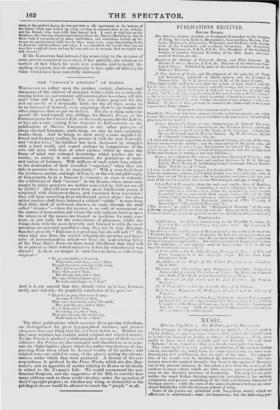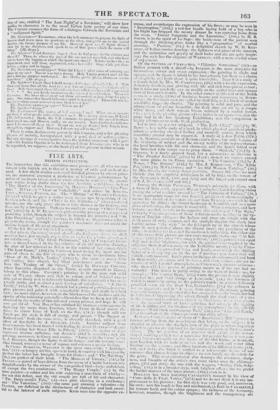MUSIC.
Re're:ries vs. Six Balt nits, par G.
This titiesag:2 is altogether calculated to As the work is %%lay to hat e ',wen its tiff. , ;titles:, the rintbliestion in London be thou,...itt to jnstify a cha:ige of language ; hich, then, ought to have be t..11 into I'd:0AI and. not French. To call these " Ballades" is an „1;surdify ; they are, ler Ow most part, ("antatas. 'lie work itst IF is a very carious productnin of the modern Italian school, and unlike any thing from the same pe.r,:r ilea we have seen. DONIZETTI, it is well has no style of his OW n. -No composi- tion of his would ever he identified by internal evidence. Ills cus- tomary resort for musical thoughts has been to the operas of Rosstm ; but in the present instance he has taken a Is;ti. from the synths of the modern German school, which are little known and :I:most prohibited even in the Austrian province of Lombardy. The saihjects are quite unlike the usual Italian rhyming materials manufacture:I for modern composers, and possess something of the dark and dreamy character of German poetry ; while the turn of the musical phrases betrays an occa- sional familiarity with the German school of song.
Some of the poems are sprinkled with Neapolitan words, which we affect not to understand; some are humorous ; but the following por- tion of one, entitled " The Lust Night:of a Noviciate," will show how unlike its character is to the usual Italian lyric poetry of our time. The Cantata assumes the form of a dialogue between the Noviciate and a " malignant Spirit."
1 hr Noriciate-" To-morrow, when the bell summons to prayer, the light of heaven shall dawn upon me prostrate at the altar, and guide me to the sacred destiny, the future purpose of my life. Descend upon Mt., 0 Spirit divine ! TiSII nee iumy slumbers, and speak to me of that peace which the bourn will brilig,." (He ;kips.) me Fond dreamer, hope,,t Ikon to find p,,ate in the cloister and the cell? Thou, to wheat the joys of life are not yet unri iled, and who last vet to learn the happiness which the heart can share? Nature invites thee to enjoyment, and wilt thou, ungrateful, rehire her call? stay, while yet there is Mae; enjoy and he happy." Tie .,Voeteiate-(cricalthw)-" What dill I hear what voice of entreaty yet limas in Inc ear? No-it was but a dream. holy Virgin, protect me! let the dawn Unduly purpose unchanged. Ave Maria, gratin pL aa, :Dominus teettm benediet a." (Ile, skips.) The Spirit-" Canst thou beheld unmoved the joys of wmo,,,I 10,-.:? thou cast front thee all the lima ties and fervent ycarniess of a father's :one- tits, Wilt that reject those v1110jonS varth a parmlis,.; * * * * See yon lovely creature-pale, dej.•et ed. beert-l•ruken. Thou art the came. loves thee: avert not thine eyes-look ai her, if but for pity's sake. Sie sines-her breath fails-h, r virit is depart in; : 'Thou wilt not see her eanst not--even nuw th"n Invest her:' up)-" out I?" The Conic !'' Th 'rite snarl of hell s'arrxtrit, me! What sweet accents au issue.? whet gentle voice mdlressed ? ve mercy on me, 0 Lord! (Ti, 1,11/ swrork) Ilark, the S:1111111011, Iii, brOt111.1, hood 11‘1:1:t MO, and Heaven smiles oat my resolve. •Vet -husband-011er- must I liizsti ear all these ties? Tempt me not, ve fiends! holy Virgin hear, streagshca, support me! Heaven, 1 devote my eel to thee I" There is some declamatory power in this Cantata. and a few pleasing gleams of melody, incorporated with a good deal Of solftrepesition. fiat any attempt at emancipation front the thdeful monotony which Italian Operas is to be welcomed from Dos dzser ; .who is to be reearded, we suppose, as the head (!) of the present Italian school.



























 Previous page
Previous page